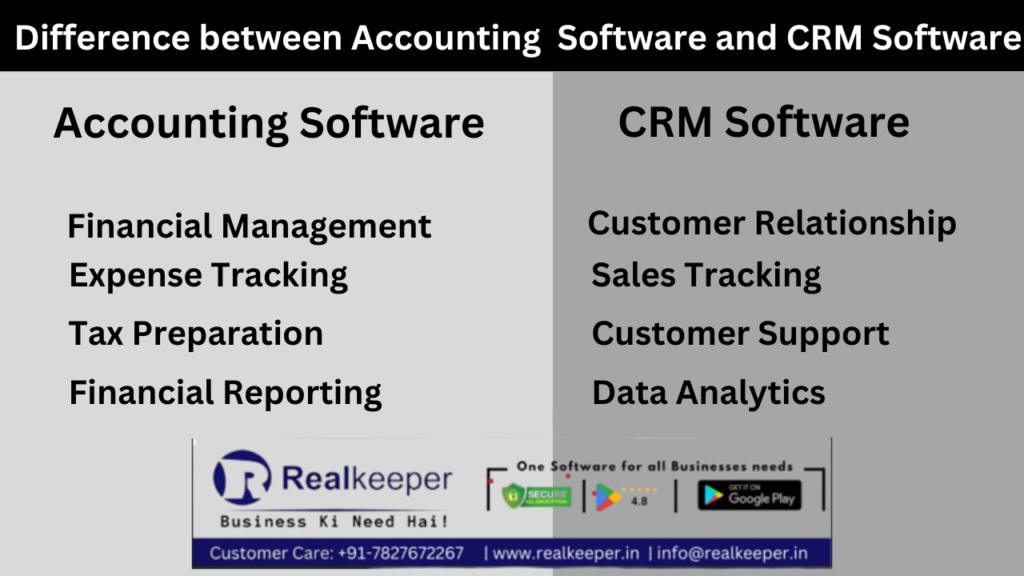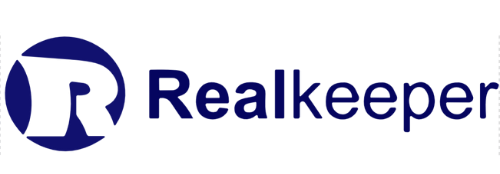Maximize Your Business Growth: Essential Differences Between Accounting Software and CRM Software Understanding the distinct functionalities and benefits of accounting software and CRM software is crucial for businesses aiming to optimize their operations. In this blog, we will delve into the Difference between accounting software and CRM software, helping you understand their distinct functionalities and how they can complement each other in your business operations.

Introduction
In the ever-evolving business landscape, leveraging the right technology is essential for efficiency and growth. Two critical types of software that businesses often consider are accounting software and CRM (Customer Relationship Management) software. While both play vital roles, they serve different purposes and offer unique benefits. This blog will explore the difference between accounting software and CRM software, helping you understand how each can enhance your business operations.
This blog will explore the key differences between accounting software and CRM software, helping you understand how each can enhance your business operations and contribute to your overall success.
What is Accounting Software?
Accounting software, like RealKeeper, is a digital tool designed to manage and streamline a company’s financial transactions. It automates tasks such as bookkeeping, invoicing, payroll, and financial reporting. By consolidating all financial data in one platform, accounting software ensures accuracy, compliance, and efficiency in financial management. Key features of accounting software include:
- Bookkeeping: Automated recording of all financial transactions.
- Invoicing: Generating and managing customer invoices.
- Payroll: Processing employee payments and managing payroll taxes.
- Financial Reporting: Generating financial statements and reports for analysis and compliance.
- Expense Tracking: Monitoring and categorizing business expenses.
What is CRM Software?
CRM software is a tool designed to manage a company’s interactions with current and potential customers. It centralizes customer data, streamlines communication, and enhances relationship management. The primary goal of CRM software is to improve customer satisfaction, retention, and sales. Key features of CRM software include:
- Contact Management: Storing and organizing customer information.
- Sales Management: Tracking sales leads, opportunities, and pipelines.
- Customer Service: Managing customer support tickets and inquiries.
- Marketing Automation: Automating marketing campaigns and tracking their effectiveness.
- Analytics: Providing insights into customer behavior and sales performance.
Key Differences Between Accounting Software and CRM Software
Now that we have a basic understanding of what accounting software and CRM software are, let’s explore their key differences:
1. Purpose and Focus
- Accounting Software: Focuses on managing financial transactions and ensuring the accuracy of financial records. It is designed to handle tasks related to bookkeeping, invoicing, payroll, and financial reporting.
- CRM Software: Focuses on managing customer relationships and interactions. It is designed to handle tasks related to sales, marketing, customer service, and contact management.
2. Data Management
- Accounting Software: Manages financial data, including transactions, invoices, expenses, and payroll information. The primary goal is to ensure accurate financial reporting and compliance.
- CRM Software: Manages customer data, including contact information, purchase history, communication logs, and support tickets. The primary goal is to enhance customer relationships and drive sales.
3. Reporting and Analytics
- Accounting Software: Provides financial reports such as balance sheets, income statements, cash flow statements, and expense reports. These reports help in financial analysis, budgeting, and compliance.
- CRM Software: Provides customer-related reports such as sales performance, lead conversion rates, customer satisfaction scores, and marketing campaign effectiveness. These reports help in sales forecasting, customer segmentation, and strategy formulation.
4. User Base
- Accounting Software: Primarily used by finance and accounting professionals who manage the company’s financial transactions and reporting.
- CRM Software: Used by sales, marketing, and customer service teams to manage customer interactions, sales processes, and support activities.
5. Integration and Synergy
While accounting software and CRM software serve different purposes, they can complement each other when integrated. By connecting these systems, businesses can achieve a more holistic view of their operations. For example:
- Financial Insights: Integrating CRM with accounting software allows sales teams to access customer payment histories, helping them make informed decisions about credit limits and payment terms.
- Streamlined Processes: Automation of invoicing and payment tracking can be enhanced by integrating CRM data, ensuring that sales and finance teams are aligned.
- Improved Customer Experience: Seamless integration ensures that customer service representatives have access to up-to-date financial information, enabling them to provide accurate and timely support.
Conclusion
In conclusion, understanding the difference between accounting software and CRM software is crucial for optimizing business operations. Accounting software, like RealKeeper, focuses on financial management, ensuring accuracy and compliance in financial transactions. CRM software, on the other hand, focuses on managing customer relationships, enhancing sales, and improving customer satisfaction. By leveraging the strengths of both types of software and integrating them effectively, businesses can achieve greater efficiency, better decision-making, and improved overall performance. So, when evaluating your business needs, consider how the difference between accounting software and CRM software can impact your success.
By leveraging the strengths of both types of software and integrating them effectively, businesses can achieve greater efficiency, better decision-making, and improved overall performance. When evaluating your business needs, consider how the difference between accounting software and CRM software can impact your success. Investing in the right tools and integrating them strategically will help your business thrive in a competitive marketplace and drive long-term growth.



